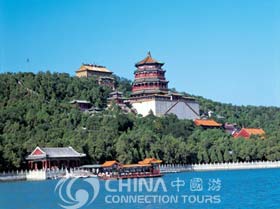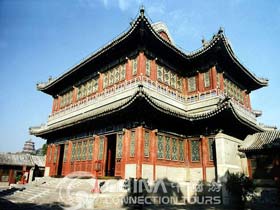
 The Summer Palace is one of the China's largest and best-preserved imperial gardens. It is a masterpiece of Chinese landscape garden design, integrating the natural landscape of hills and open water with man-made features into a harmonious and aesthetically exceptional whole. With a concentration of the best of ancient buildings as well as styles of gardening, it is a virtual museum of traditional Chinese gardening. The Summer Palace with its cool features - water, gardens and hills - was the palace of choice for vacationing emperors and Dowager Empresses during the summer time. It was badly damaged by Anglo-French troops during the Second Opium War (1860) and its restoration became a pet project of the Empress Dowager Cixi, last Qing dynasty rulers. The 100-odd examples of traditional architecture in the park include pavilions, terraces, temples, pagodas, waterside gazebos, covered corridors, stone bridges and the famous marble boat. The palace occupies a total area of 290 hectares, three quarters of which is made up of shallow lakes.
The Summer Palace is one of the China's largest and best-preserved imperial gardens. It is a masterpiece of Chinese landscape garden design, integrating the natural landscape of hills and open water with man-made features into a harmonious and aesthetically exceptional whole. With a concentration of the best of ancient buildings as well as styles of gardening, it is a virtual museum of traditional Chinese gardening. The Summer Palace with its cool features - water, gardens and hills - was the palace of choice for vacationing emperors and Dowager Empresses during the summer time. It was badly damaged by Anglo-French troops during the Second Opium War (1860) and its restoration became a pet project of the Empress Dowager Cixi, last Qing dynasty rulers. The 100-odd examples of traditional architecture in the park include pavilions, terraces, temples, pagodas, waterside gazebos, covered corridors, stone bridges and the famous marble boat. The palace occupies a total area of 290 hectares, three quarters of which is made up of shallow lakes.
A cluster of grand buildings adorn the middle section of the Longevity Hill. On the slope from the lakeside to the hilltop stand: a decorated archway called Jade-Like Firmament in Bright Colors, Cloud-Dispelling Hall, Hall of Virtuous Brilliance, Pavilion of Buddhist Incense and Temple of the Sea of Wisdom. Standing on the top of the hill, a visitor commands a spectacular view of buildings of different shapes and sizes down below, their golden roofs glittering under the sun; the placid, huge Kunming Lake dotted with rowing boats; a 17-arch bridge on the southern bank of Kunming Lake is more than 150 meters long. Carved stone lions, of different sizes and postures, sit on top of the bridge's stone columns; the bridge that connects an island with the lake's southern bank; the long, winding west bank of the lake joined by six bridges; and the distant West Hills. Along the northern bank of Kunming Lake runs the Long Corridor with a total length of 728 meters and 273 sections. It is like a necklace for Longevity Hill. Strolling in the corridor, a visitor sees an endless lineup of corridor stands stretching into the distance or curving away elegantly at soft angles as well as Kunming Lake sparkling under the  sun. The crossbeams of the Long Corridor are decorated with more than 8,000 color paintings with Chinese landscape and historical stories as their themes. An octagonal pavilion stands at one end of the bridge and near the pavilion lies a bronze ox with its head raised toward the lake. On the back of the ox is engraved a line from Emperor Qianlong stating that the ox is used to control flooding of the lake. A Ming-style Street winds along a stretch of water on the back side of Longevity Hill. The Suzhou Street, 300 meters long, is lined with more than 60 shops and decorated with archways and gateways. The shops, of different shapes and sizes, are built with bluish gray tiles and bricks. The marketplace lends a folksy flavor to the imperial garden.
sun. The crossbeams of the Long Corridor are decorated with more than 8,000 color paintings with Chinese landscape and historical stories as their themes. An octagonal pavilion stands at one end of the bridge and near the pavilion lies a bronze ox with its head raised toward the lake. On the back of the ox is engraved a line from Emperor Qianlong stating that the ox is used to control flooding of the lake. A Ming-style Street winds along a stretch of water on the back side of Longevity Hill. The Suzhou Street, 300 meters long, is lined with more than 60 shops and decorated with archways and gateways. The shops, of different shapes and sizes, are built with bluish gray tiles and bricks. The marketplace lends a folksy flavor to the imperial garden.

